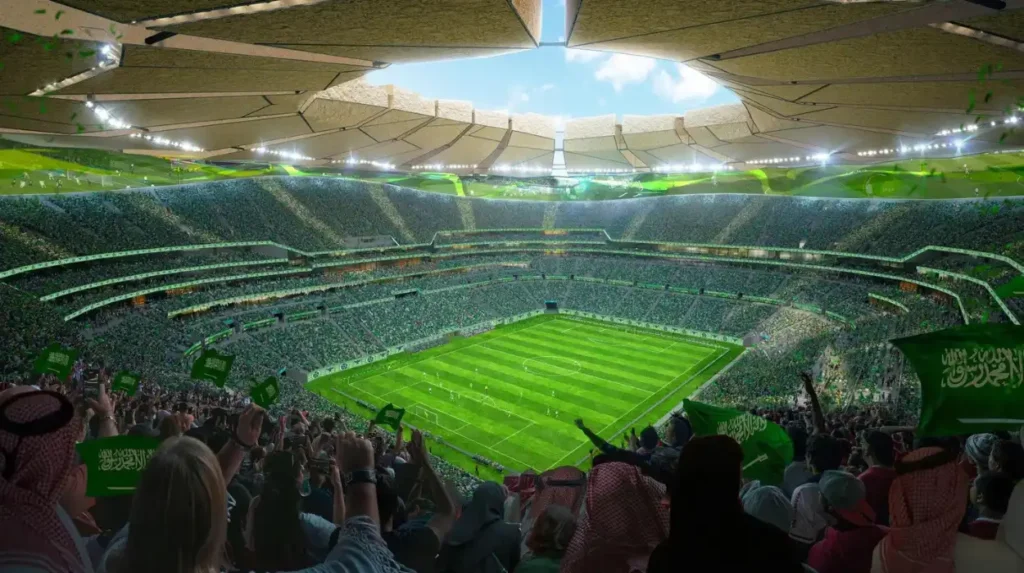Saudi Arabia has been making headlines with “green walls” — vertical gardens that will supposedly cool cities, clean air, and be a step toward sustainable urbanization. This sounds like a revolutionary step on the surface. Local newspapers have reported that these new technologies are proof that the Kingdom is serious about curbing climate change, curbing urban heat, and achieving the UN Sustainable Development Goals.
But here is where it gets complicated: these green projects are being rolled out while Saudi Arabia is staging the 2034 FIFA World Cup — an event that promises to be the biggest instance of sportswashing in the contemporary era. No amount of greenery on skyscrapers can cover up the country’s record on human rights, its structural oppression, and the self-evident contradictions of its environmental record.
Green Walls: A Green Technology with Real Benefits
Let’s get one thing straight — green walls themselves are not the problem. Living walls have been around for thousands of years, used for both beauty and functionality like shading buildings, cooling them, and even as a food source. The contemporary rediscovery, led by French botanist Patrick Blanc in the late 20th century, employs hydroponic plant systems to cultivate plants vertically in soilless applications.
These systems can:
- Reduce the urban heat island effect
- Provide natural building insulation
- Improve air quality
- Reuse greywater and reduce water wastage
- Lower energy consumption for cooling
Architects and sustainability leaders, like Faisal Al-Fadl in Saudi Arabia, rightly point out that living walls can help cities shift from a “consumption” to a “regeneration” mindset. They are a proven element of sustainable design.
The Problem: Sustainability as a PR Shield
Saudi Arabia’s push for green walls and other sustainable programs coincidentally runs alongside its push to rebrand itself as a modern, progressive nation in the lead-up to the 2034 FIFA World Cup. Not an accident. It’s part of a broader sportswashing program — the use of high-profile sport events to promote a country’s global image and divert attention from human rights abuses.
Environmental PR in the Kingdom is selective. Saudi Arabia continues to depend vastly on oil exports, one of the world’s largest carbon producers, while publicizing Riyadh or Jeddah vertical gardens, and invests billions in colossal projects with colossus environmental implications such as Neom — a futuristic city built in the desert, highlighting crucial ecological and human displacement concerns.
The Human Rights Context FIFA Can’t Ignore
Hosting the World Cup is not only a sporting event — it’s a platform of international legitimacy. Bestowing this event upon a state with such a terrible human rights track record sends the wrong message. Saudi Arabia has:
- Criminalized dissent and greatly restricted freedom of speech
- Imprisoned and tortured women’s rights activists
- Had a justice system that facilitates public executions
- Enacted draconian restrictions on LGBTQ+ persons
- Relied on exploited migrant labor to build its mega-projects
The Qatar 2022 World Cup experience is a cautionary one. With promises of reform, thousands of workers toiled in squalor, subjected to late pay and hazardous working conditions. Saudi Arabia’s labor system contains much the same dangers.
Environmental Hype vs. Reality
Green walls may look grand on glossy architectural drawings, but they are localized solutions in the shadow of extensive ecological damage. Apart from the increase in the use of fossil fuel, Saudi Arabia’s massive energy-thirsty projects require massive resources inputs — water, materials, and energy — within a desert context already experiencing the pressure of climate change.
There is also the matter of scale. A couple of green buildings in the urban areas will not begin to make amends for the flights of the world, construction, and operations of a month-long World Cup, besides the reality that the country is going to build new stadiums and infrastructure from the ground up.
Why FIFA Should Ban Saudi Arabia from Hosting
FIFA has a duty to ensure that the World Cup is not used as a reputational laundering tool. Allowing Saudi Arabia to host in 2034 is against the values that it claims to uphold, for instance, respect for human rights and respect for the environment.
By hosting the tournament in Saudi Arabia, FIFA would:
- Legitimize sportswashing and set a precedent that image over ethics is more desirable
- Ignore labor rights and safety of workers who will build and serve the event infrastructure
- Look the other way at restrictions on freedom of the media, fan expression, and LGBTQ+ involvement
- Sanction a green paradox in which cosmetic green actions mask massive-scale environmental devastation
Greenwashing the World Cup
Saudi Arabia’s green walls are not merely a sustainability project — here, they become part of greenwashing the 2034 World Cup bid. The Kingdom can tout these projects as proof of outward-looking environmental change while avoiding more fundamental reforms.
This is a deliberate communications approach:
- Highlight small-scale green initiatives — green walls, solar bus stops, reforestation campaigns.
- Downplay large-scale environmental harm — oil drilling, mega-project ecological devastation.
- Connect “progress” to meaningful action — using the World Cup to cement the image of a modern, climate-conscious nation.
No Green Facade Can Cover the Truth
Green walls are an actual tool for creating improved cities — but into the hands of repressive governments preparing to host global mega-events, and they can be diversionary tools. The Saudi bid for the 2034 FIFA World Cup is not just about football; it’s about recasting its global reputation while avoiding real accountability.
For FIFA, the choice is clear: either defend the principles of human rights and sustainability or be a part of the largest sportswashing campaign in our time. If it really feels that there must be fair play — on and off the pitch — then it must take action and not allow Saudi Arabia to hold the World Cup in 2034.

